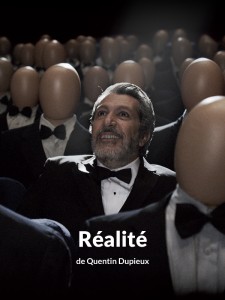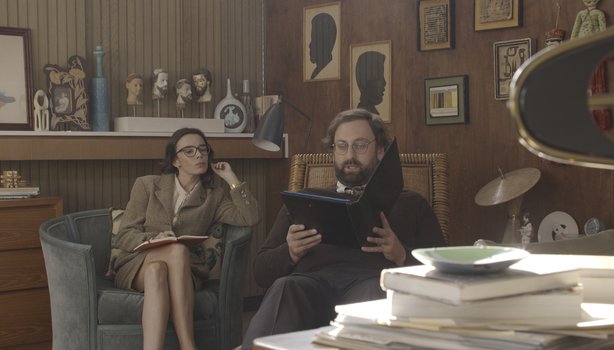Réalité
Written and directed by Quentin Dupieux
2014, France
Presented as part of the Temps O’s FNC program, Réalité is reminiscent of great names of absurd oneiric cinema, the most obvious influence being David Lynch. The movie also alludes to French surrealism in cinema and novels, such as novelists Andre Breton or Boris Vian. Dupieux’s delightful and hilariously neurotic film producer Bob Marshall could have been in a Jacques Tati movie or Boris Vian’s L’écume des jours. The film’s overall absurdist yet calm atmosphere makes it a strong example of the movement.
The image is bright, sunny and yet has a particular color and ambiance to it that makes the line between reality, dreams, and other parallel realities blur. As they all blend in this same photography and the same music, Philip Glass’s hour long song “Music with Changing Parts”, puts doubt in our minds as we wonder what reality exactly we are witnessing.
Indeed, music and Glass’s song play an important role in creating the particular mood and world that Réalité builds. While Dupieux’s previous films use his own music, he explains his alter-ego, Mr. Oizo’s, music won’t be used in his movies anymore to avoid being too self-centered. Here, the psychedelic and frenetic tone of Music with Changing Parts fits perfectly this playful dedalum of realities that plays with our expectations and necessity to find a sense and a logic to the labyrinth. Dupieux explains during the Q&A that the movie is a game and it has no message. It is at best a mental exercise that uses various tools to transport us to this other reality for an hour and half. It is like Dora the Explorer for adults he adds.

Cinema is at the core of the movie, psychoanalysis, psychology, television and the meaning of dreams too. The movie contains many references to Dupieux’s previous films. Réalité, he explains, was the movie that accompanied him and that was writing on and off while shooting his previous ones.
The mise en abyme that we witness at several moments in the film presents us with interesting perspectives on cinema. From the eccentric documentary filmmaker Zog who, in order to film his young actress’ dreams, waits until she actually falls asleep, to a filmmaker who finds out the movie he is writing already exists, all of this puts cinema, and especially its meaning, power and significance regarding the “real world” as one of the core elements of the movie, along with dreams and their symbolism.
To a spectator who compared the movie to Inception, Dupieux answers his movie is like a better and more complex Inception—“it was one of the most boring experience”, he says referring to watching Inception-“everything was constantly explained, every five minutes”. Here, the spectator can only try to wonder around for a pertinent explanation, while the meaning seems constantly shifting and the interplay of realities become deeper and more entrenched. Just like the music that keeps being repeated and stays the same, our understanding seems to find a wall and come back at the very beginning every time something seems to make sense and some connections appears.
The movie is supported by excellent actors: the great Alain Chabat as a filmmaker trying the find the perfect scream, Elodie Bouchez as a stressed psychoanalyst specializing in dreams or Jonathan Lambert, simply excellent in portraying a French neurotic and eccentric film producer and lover. Overall, the movie is a very well done interesting and oneiric experience.
Anne-Myriam Abdelhak


